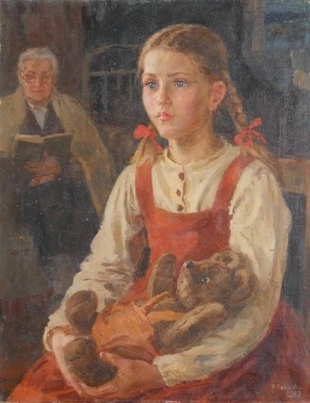Презентация по теме "Творчество Шекспира"
Работа была представлена на конкурсе "Творчество Шекспира"
Скачать:
| Вложение | Размер |
|---|---|
| 2.33 МБ |
Предварительный просмотр:
Подписи к слайдам:
Слайд 1
William SheakspeareСлайд 2
William Shakespeare ( 26 April 1564 (baptised) – 23 April 1616) was an English poet, playwright, and actor, widely regarded as the greatest writer in the English language and the world's pre-eminent dramatist. He is often called England's national poet and the "Bard of Avon". His extant works, including some collaborations, consist of about 38 plays, 154 sonnets, two long narrative poems, and a few other verses, of which the authorship of some is uncertain. His plays have been translated into every major living language and are performed more often than those of any other playwright.
Слайд 3
Early life William Shakespeare was born in Stratford-upon-Avon and baptised there on 26 April 1564. His actual date of birth remains unknown, but is traditionally observed on 23 April, Saint George's Day. This date, which can be traced back to an 18th-century scholar's mistake, has proved appealing to biographers, since Shakespeare died 23 April 1616. He was the third child of eight and the eldest surviving son. Although no attendance records for the period survive, most biographers agree that Shakespeare was probably educated at the King's New School in Stratford, a free school chartered in 1553.
Слайд 4
Sheakspeare's birthplace
Слайд 5
At the age of 18, Shakespeare married the 26-year-old Anne Hathaway. The consistory court of the Diocese of Worcester issued a marriage licence on 27 November 1582. The next day, two of Hathaway's neighbours posted bonds guaranteeing that no lawful claims impeded the marriage. The ceremony may have been arranged in some haste, since the Worcester chancellor allowed the marriage banns to be read once instead of the usual three times, and six months after the marriage Anne gave birth to a daughter, Susanna, baptised 26 May 1583. Twins, son Hamnet and daughter Judith, followed almost two years later and were baptised 2 February 1585. Hamnet died of unknown causes at the age of 11 and was buried 11 August 1596.
Слайд 6
After the birth of the twins, Shakespeare left few historical traces until he is mentioned as part of the London theatre scene in 1592. The exception is the appearance of his name in the 'complaints bill' of a law case before the Queen's Bench court at Westminster dated Michaelmas Term 1588 and 9 October 1589. Scholars refer to the years between 1585 and 1592 as Shakespeare's "lost years". Biographers attempting to account for this period have reported many apocryphal stories. Nicholas Rowe, Shakespeare's first biographer, recounted a Stratford legend that Shakespeare fled the town for London to escape prosecution for deer poaching in the estate of local squire Thomas Lucy. Shakespeare is also supposed to have taken his revenge on Lucy by writing a scurrilous ballad about him. Another 18th-century story has Shakespeare starting his theatrical career minding the horses of theatre patrons in London. John Aubrey reported that Shakespeare had been a country schoolmaster. Some 20th-century scholars have suggested that Shakespeare may have been employed as a schoolmaster by Alexander Hoghton of Lancashire, a Catholic landowner who named a certain "William Shakeshafte" in his will. Little evidence substantiates such stories other than hearsay collected after his death, and Shakeshafte was a common name in the Lancashire area
Слайд 7
London and theatrical career
Слайд 8
It is not known exactly when Shakespeare began writing, but contemporary allusions and records of performances show that several of his plays were on the London stage by 1592. In 1599, a partnership of company members built their own theatre on the south bank of the River Thames, which they called the Globe. In 1608, the partnership also took over the Blackfriars indoor theatre. Records of Shakespeare's property purchases and investments indicate that the company made him a wealthy man. In 1597, he bought the second-largest house in Stratford, New Place, and in 1605, he invested in a share of the parish tithes in Stratford. Some of Shakespeare's plays were published in quarto editions from 1594. By 1598, his name had become a selling point and began to appear on the title pages. Shakespeare continued to act in his own and other plays after his success as a playwright. The 1616 edition of Ben Jonson's Works names him on the cast lists for Every Man in His Humour (1598) and Sejanus His Fall (1603). The absence of his name from the 1605 cast list for Jonson's Volpone is taken by some scholars as a sign that his acting career was nearing its end. The First Folio of 1623, however, lists Shakespeare as one of "the Principal Actors in all these Plays", some of which were first staged after Volpone, although we cannot know for certain which roles he played. In 1610, John Davies of Hereford wrote that "good Will" played "kingly" roles. In 1709, Rowe passed down a tradition that Shakespeare played the ghost of Hamlet's father. Later traditions maintain that he also played Adam in As You Like It and the Chorus in Henry V, though scholars doubt the sources of the information.
Слайд 9
Old Sheakspeare's book
Слайд 11
Procession of Characters from Shakespeare's Plays by an unknown artist
Слайд 12
Sheakspeare's plays in the Globe theatre
Слайд 13
The reconstructed Globe Theatre, London
Слайд 14
Later years and death Shakespeare died on 23 April 1616, at the age of 52.[64] He died within a month of signing his will, a document which he begins by describing himself as being in "perfect health". There is no extant contemporary source that explains how or why he died. After half a century had passed, John Ward, the vicar of Stratford, wrote in his notebook: "Shakespeare, Drayton and Ben Jonson had a merry meeting and, it seems, drank too hard, for Shakespeare died of a fever there contracted." This is not impossible, for Shakespeare knew Jonson and Drayton. Of the tributes that started to come from fellow authors, one refers to his relatively early death: "We wondered, Shakespeare, that thou went'st so soon/From the world's stage to the grave's tiring room.
Слайд 15
Shakespeare's funerary monument in Stratford-upon-Avon Shakespeare's grave, sitting next to Anne Shakespeare, his wife, and to Thomas Nash, the husband of his granddaughter.
Слайд 16
Hail to the great playwrighter! Rest in peace, William Sheakspare...
Слайд 17
Thank you for your attention!

А теперь — мультфильм

Круговорот воды в пакете

Афонькин С. Ю. Приключения в капле воды

Именинный пирог

Шелковая горка
